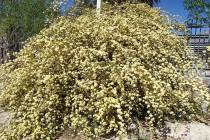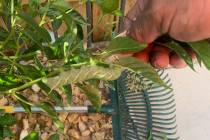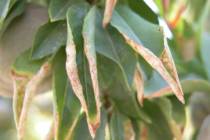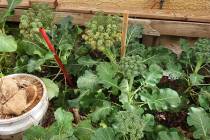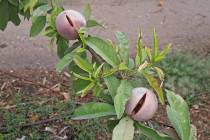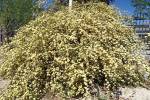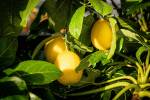Late cold spell delays fruit harvest
Most of the early fruit, such as apricots and early peaches, are almost two weeks behind right now due to cold weather. And trees are loaded with a bumper crop this year. Our apricots would normally be ready to harvest the first week of May. With it getting hot like it is right now they will start to catch up but I am guessing they will be at least one week behind at the time of harvesting.
To be safe I am projecting that apricots will be plentiful by mid-May. We will have picked apricots available at the University of Nevada Cooperative Extension Master Gardener Orchard in North Las Vegas. If you would like to be notified when fruit is ready and its availability, please e-mail me at morrisr@unce.unr.edu or call 257-5509. We do not offer pick-your-own fruit but Gilcrease Orchard does .
Olives are now blooming. You can reduce the amount of pollen by hosing the flowers on the tree with a high-pressure nozzle. An inexpensive one to use is a sweep nozzle that attaches to the end of a garden hose. Hose the flowers on the tree every two to three days so that you can catch them when they are open and releasing pollen.
Hosing the flower helps by wetting the pollen and causing it to drop on the ground instead of blowing in the air. If you want to prevent olive fruit from forming, you must spray the flowers when they are open with a chemical growth regulator such as Olive Stop. You would do this when the flowers are about 20 percent open and then again when they are about 80 percent open. That would translate to about now in most cases and then follow up with a second spray in about a week if the weather stays warm.
Many vegetable and fruit garden pests are now getting active. A very good spray to use and one that is very gentle on your garden and fruit is plain old soapy water. Even though it is gentle, it does not discriminate between good bugs and bad bugs so be careful to spray in the early morning hours or just before sundown when bees have gone home. Soapy water has no residue so you have to spray two to three times a week. But the sprayer cleans up really well!
You can buy a soapy water blend from nurseries and garden stores or you can make your own. Use about 1 tablespoon of a unscented or unadulterated dishwashing liquid in a gallon of water. Add it to the water, not the other way around, to minimize foaming. However, insecticidal soaps available from nurseries and garden centers are better products and reduce the chances of plant damage.
Another good pesticide to have around is the Bt spray marketed as Dipel or Thuricide. It can be applied and purchased as a liquid or a dust. Sometimes the dust is more convenient to apply, using a light dusting on the plants you want to protect. This would be all your tomatoes, peppers, eggplants and the and others as well. Spray only when bees are not present and plants are not in bloom.
If you have grapes, you might want to use the liquid form of Bt and spray the entire vine when the sun is setting or rising. Follow up with another spray in about a week or 10 days.
Recently, when the temperatures got warm, going from downright cool or cold to hot, lawns got hit bad with a disease. The disease is a lack of water.
Most of the grasses will come back nicely even if they look fried right now. Just keep the area moist, not wet, and put on a light application of lawn fertilizer. It should start to come back in about a week.
Q: I have a large mesquite tree in my front yard and, while providing wonderful shade for my house, it dumps a multitude of junk every season onto my rock landscape: banana-shaped seed pods, yellow pollen, leaves, you name it. I am also allergic to it. I would love to chop it down and wonder if you have any suggestions for this and can recommend an alternative tree to plant in its place.
A: Sorry to hear about the problems with your mesquite. Yes, several desert trees, such as mesquite and palo verde, have allergenic pollen. All trees can be messy and it is a problem when we use mulches that cannot handle debris.
There are colors and mixtures of rock mulch that are much more forgiving about debris and actually look good with some debris dropped on them. If the mulch is a formal mulch in appearance, then it will require constant attention much like a indoor carpeting and its need for vacuuming.
Landscapes are much like exterior rooms with ceiling, walls and flooring. By picking a "flooring" for your landscape that can handle debris, there will be less work for you . Multicolored rock mulch, particularly of different sized rocks or textures, will help.
If you need to take the mesquite tree down, remember that mesquite wood makes wonderful smoking and grilling wood instead of having it hauled off somewhere. You may elect to have an arborist come in and grind out the stump left behind . The stump grindings make excellent materials for composting and mulching.
As far as replacement trees, I do not make plant recommendations or suggestions. This is best left to your personal preference. I have found it to be far too subjective and there are problems with all plants.
Q: I planted a new apricot tree last month and it is really doing good. There is new growth all over but I noticed that the tender leaves are being eaten by some bug or something. It is not happening in the daytime and I went out last night to check and it seems like moths or something fluttering about. Any suggestions?
A: Moths can't eat leaves. They do not have the right mouth parts for eating leaves. Their mouth parts are siphoning types made for visiting flowers. Their immature stage, caterpillars, do have chewing mouth parts.
Without seeing the damage I would assume it to be wind damage. We saw tent caterpillars in the orchard earlier but they are now gone.
Bob Morris is an associate professor with the University of Nevada Cooperative Extension. Direct gardening questions to the master gardener hot line at 257-5555 or contact Morris by e-mail at morrisr@unce.unr.edu.










